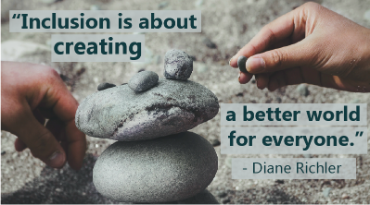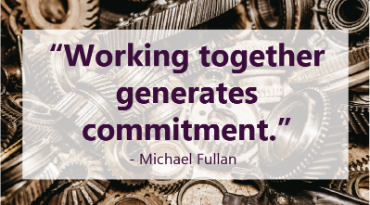“Inclusion is not a strategy to help people fit into the systems and structures which exist in our societies. It is about transforming those systems and structures to make it better for everyone. Inclusion is about creating a better world for everyone.”
This quote from Diane Richler, Past President, Inclusion International, stirs some questions for educators to consider:
- Are we still trying to help people fit into systems and structures, or are we creating new systems and structures that are truly inclusive?
- How do schools and classrooms make these transformations?
- What is my role in the change process that will create a better world for everyone?
We cannot do this alone. Collaboration is the key to this transformation. Working together to recreate our educational system is the avenue to establishing the changes that need to be made!


Why Collaboration Works
Effective teacher collaboration improves performance for all students and improves teacher quality. But what causes collaboration to have such a powerful effect? Michael Fullan, in How the World’s Most Improved School Systems Keep Getting Better (2015), helps us understand why collaboration works:
"The power of collective capacity is that it enables ordinary people to accomplish extraordinary things for two reasons. One is that knowledge about effective practice becomes more widely available and accessible on a daily basis. The second reason is more powerful still—working together generates commitment” (p 72).
Collaboration works because we share our knowledge with one another. Together, teacher teams plan the lessons, reflect on the pedagogy, analyze data, and make necessary adjustments to their instruction based on the data.
Teacher teams learn from one another– each bringing their specialized skills to the collaborative effort as equal partners. Special educators share their expertise in accommodations and effective learning strategies while the classroom teachers share their content knowledge, essential learnings, and content specific pedagogy. And the bonus is that the very act of working with one another builds commitment– commitment to the work, to the students, and to one another. Commitment then becomes the mortar for sustainability.

Collaboration between CTE teachers and Special Educators is especially important because CTE participation improves college and career readiness outcomes. A 2017 study by Theobald et al. of 150,000 students with disabilities in Washington state revealed that those students who completed four or more CTE classes have better attendance, are more likely to graduate on time, and have a 20% greater chance of being employed once they graduate.
Note: There are different models for collaboration. Last month's Third Thursday conversation highlighted Evergreen School district's co-teaching model. For our March Third Thursday, representatives from Toppenish High School join us to discuss the consultant/specialist model being used at their school. We hope you can join us!
Additional Resources:

2021 Events
- IPP events are live-captioned and ASL-interpreted.
- Teams of special education and CTE instructors are encouraged to attend together.
- To access materials from previous events, visit the IPP Resources page.
Collaboration
March 18, 2021; 3-4 p.m. PT
Quality collaboration improves student outcomes and improves educators. Principal Bonnie Smith and staff from Toppenish High School join us to discuss best practices. Questions include: what strategies do you find effective for collaboration, and how does your team find time for quality collaboration.
Register for IPP Third Thursday on 03/18/2021 - Collaboration
Designing the Change
April 22, 2021; 3-4:30 p.m. PT
Designing the Change is the culminating seminar of the 2020-21 CCTS Inclusionary Practices Project, focusing on increasing inclusionary practices in general education and partnerships between Special Education and CTE classrooms.
Guided by a panel of professionals in the field, participants in this seminar will work through the Managing Complex Change process and design a plan to implement increased inclusionary practices. Wherever you are on your inclusionary practices journey, we hope you will join us!
Participation in previous IPP seminars is not a requirement to attend. For your reference, presentation materials from Seminar 1: Catching the Vision, and Seminar 2: Voices from the Field, are available on the CCTS Inclusionary Practices Resources page.
Planning for Next Steps
May 20, 2021; 3-4 p.m. PT
With this year ending and the beginning of next year in sight, what is your plan to increase inclusive efforts in your classroom, your school, your district? How will you develop, or enhance a culture of inclusion? What structures need to be put into place? What skills need to be developed? Is there a practice you want to implement? Join us for an informal conversation to share your strategies and learn from the best practices of other educators.
Register for IPP Third Thursday on 05/20/2021 - Planning for Next Steps
Past Training Materials and Recordings
Slide decks and captioned recordings from CCTS trainings are available online under Inclusionary Practices Resources. Topics include:
- Accommodations 101
- Aligning High School and Beyond Plans and IEPs
- CTE and Special Education Partnerships
- Effective Collaboration
- Finding Your CTE Data
- T-Folio 101+
- ...and more!
Don't miss the latest CCTS IPP updates!
